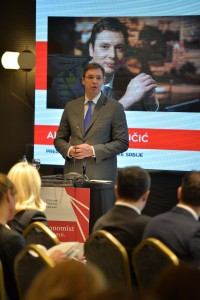We had one Great Recession in the 20s and the 30s, and apparently this is the second Great Recession we face, and it is a prolongued one, since it has lasted for some 7 years. We do not see easy way out from the world crisis, nor it is going to be a quick one. We face difficulties concerning the price of copper and other commodity prices, but I think that we managed to overcome the obstacles with dilligence, perseverance, and serious approach to work this time. We will see a better future soon, but the export-orientated economies of the EU will see some tough times during next year. Nevertheless the clouds will disappear in 2017 over major part of Europe too. The Fed’s decision will not influence our market in a good way, but we are quite happy it did not turn out to be worse. I am afraid that futher rise of American dollar will influence negatively the public debt of Serbia, but our task is just to hedge the effect and to neutralise the negative impacts.
We have to emulate the experiences of developed countries no matter if they are in the EU or not – Europe is not the goal by itself.
What is essential is to understand that we cannot live isolated from the global economic environment / we are in the same basket with all the others essentially and we have to find our ways to manage the situation. We have to do our best and to adapt to the global circumstances. We have to learn permanently and to make ourselves better, and to learn what I have learnt from Shimon Peres. This is not an easy task and maybe we will not implement it in a year or two, maybe it will take five or ten years, but we will get there. The objective is simple: apart from studying for six hour, our children should spent addition two ours working and vice versa, the grown-ups should work for six hours and spend two hours of their working day learning. We have to learn that we have not stopped learning at the moment of graduation at the age of 23. We have to continue leraning and to be prepared to be surprised by new technologies and to adapt them eagerly. It will break some taboos in this country and as usual, the majority will be against that.
Therefore I think that the motto of The Economist: The World in 2016 starting with “woes” clearly depicts the state of mind in the world and in Serbia. We always complain, but we will have to change it and to make a progess. Therefore we insist on so-called “dual education”, and our partners are Germans, Swiss, and some Scandinavian countries. I deeply believe that in the next year we will continue with the improvement of the business climate in Serbia and I find it quite satisfactory that The World Bank has mathaematical assessment of this effort of ours. Apart from the progess on the “Doing Business” list (we sincerely hope to move from the 59th position held in 2015 to Top 40 in 2016) we also hope that we will get many more foreign direct investments. We are ending this year with 1.6 billion euros of foreign direct investments which is in the time of crisis quite satisfactory thus making our one of the region’s leaders.
We also managed to diminish fiscal deficit, but it will not be shown that much since we will try to take over some older debts left from other goverments. But it is not the objective of this government. We plan to make our economy far less state-dependent, instead we would like to motivate the entrepreneuship spirit and we all all deeply aware that this is a task most uneasy. But we have to start talking about “sane” and “healthy” business, and the State must cease to be the source of infinite protection at one moment. In 2016 I do expect the GDP rise of 2% to 2.5% and 3% and more in 2017. We also do not aim to copy the EU countries, since it does not mean much if we do not standards fulfilled: we need to taka after Switzerland and Norway, which are not EU members. We will nevertheless try to obtain it through the approach to the EU by opening the chapters. I am optimistic about the economic future and we will also try to maintain stability which is crucial for development.
